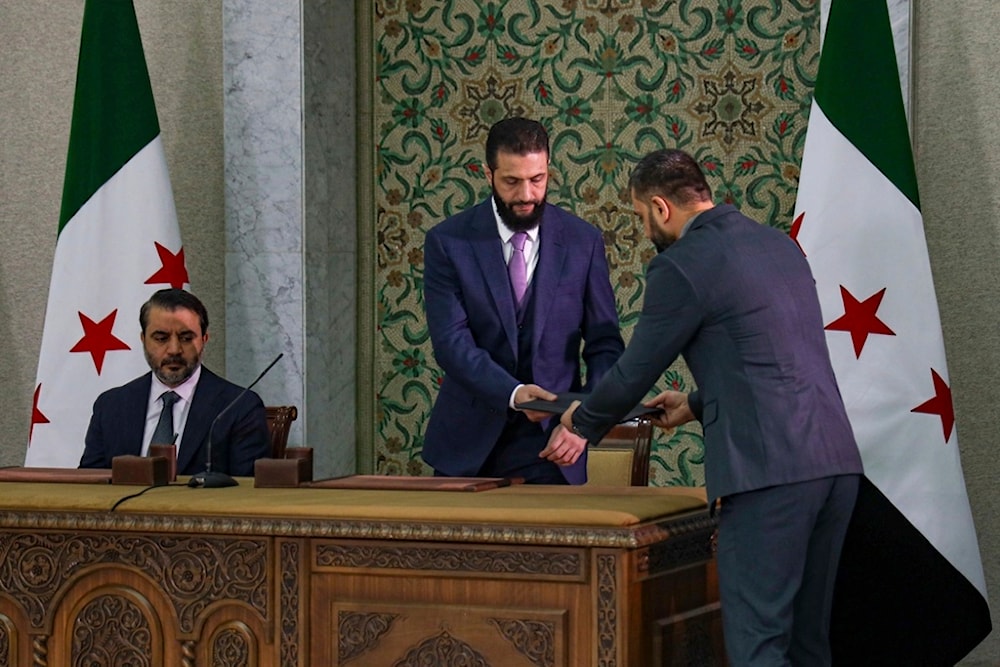Kurdish-Led admin rejects al-Sharaa constitutional declaration
During the signing ceremony at the presidential palace, Ahmad Al-Sharaa expressed hope that the declaration would be a turning point for the country.
-

Syria's interim president Ahmad Al-Sharaa, center, prepares to sign a temporary constitution for the country in Damascus, Syria, Thursday March 13, 2025. At left foreign minister Asaad Hassan al-Shiban (AP Photo/Omar Albam)
The declaration, which takes effect upon its official publication, has already faced criticism from Syria's Kurdish-led administration in the northeast. Kurdish officials dismissed it as out of touch with the country's diverse social fabric, arguing that it "contradicts the reality of Syria and its diversity."
"It lacks the... spirit of Syria's people and its various components from Kurds to Arabs, as well as Syriacs, Assyrians, and other," the administration stated.
Earlier this week, the Syrian Democratic Forces (SDF), which functions as the military arm of the Kurdish-led administration, struck a deal with authorities in Damascus to integrate into state institutions. However, Kurdish officials on Thursday accused the new government of undermining efforts to "achieve true democracy."
While the constitutional declaration aims to provide a legal foundation for the next five years, resistance from Kurdish groups and lingering sectarian tensions signal that Syria's transition remains fraught with challenges.
Al-Sharaa signed constitutional declaration
Syria's interim president Ahmad al-Sharaa signed a constitutional declaration on Thursday, marking what he described as the beginning of "a new history" for the country. The declaration sets the legal framework for a five-year transitional period and outlines fundamental rights, including alleged protections for freedom of expression and women's participation in public life.
The move comes three months after Islamist-led rebel factions toppled Bashar al-Assad's government, prompting calls for a new, more inclusive Syria. However, the transition has been overshadowed by recent violence along Syria's Mediterranean coast, where a war monitor reported that nearly 1,500 civilians, primarily from the Alawite minority, were killed.
During the signing ceremony at the presidential palace, al-Sharaa expressed hope that the declaration would be a turning point for the country. "A new history for Syria, where we replace oppression with justice... and suffering with mercy," he said.
The newly formed authorities had previously abolished al-Assad's constitution and dissolved parliament. The declaration formally establishes a transitional justice commission tasked with "determining the means for accountability, establishing the facts, and providing justice to victims and survivors" of the previous administration's alleged abuses.
The document also guarantees "women's right to participate in work and education, and have all their social, political, and economic rights guaranteed," according to Abdul Hamid al-Awak, a member of the drafting committee.
Governance and Islamic Law
The declaration maintains a religious requirement for leadership, stating that the president must be Muslim and that Islamic jurisprudence will serve as 'the main source' of legislation. It also asserts a strict separation of powers, with Awak citing "toppled president Assad's encroachment on other branches of government" as a past failure.
The transitional government will be structured around a people's assembly, one-third of which will be appointed by the president, responsible for drafting all legislation. A supreme electoral committee will oversee parliamentary elections.
Under the terms of the declaration, lawmakers do not have the authority to impeach the president, nor can the president dismiss members of the legislature. However, the president will retain the exclusive power to declare a state of emergency. Awak noted that "rapid action to confront any difficulties" would be necessary during the transition.
The document also guarantees the "freedom of opinion, expression, and the press" and affirms the independence of the judiciary. A separate committee will be formed to draft a permanent constitution.
Read more: Syria's al-Sharaa establishes National Security Council he will chair

 4 Min Read
4 Min Read








